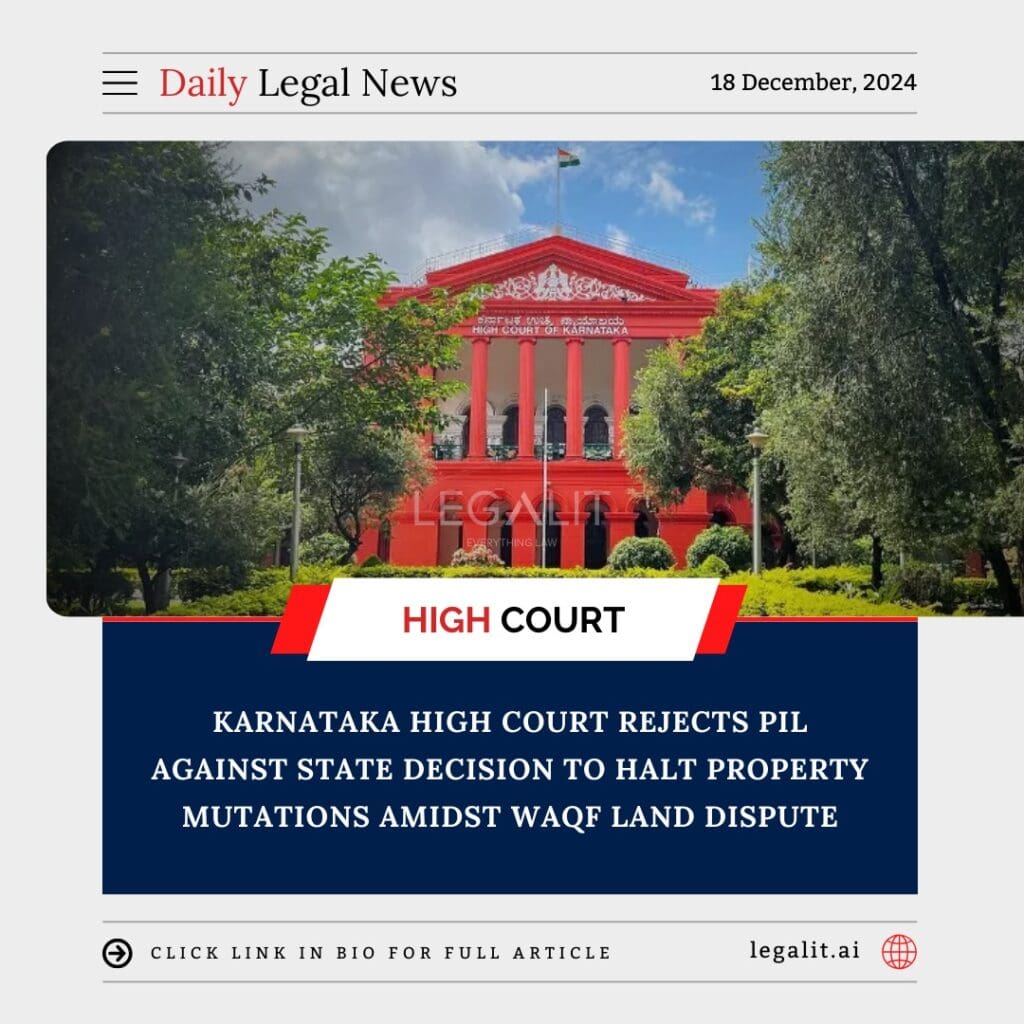
The Karnataka High Court has dismissed a Public Interest Litigation (PIL) challenging the state government’s decision to halt property mutations amidst a dispute over Waqf land. The PIL, filed by a group of petitioners, contested the government’s move to temporarily stop property mutations in light of the ongoing legal conflict surrounding the ownership and control of Waqf properties.
Background:
The dispute centers around a Waqf land, which is property held in trust for religious or charitable purposes. The Karnataka state government had issued a directive to temporarily freeze property mutations concerning Waqf land until the issue of ownership and encroachment is resolved. This decision came in response to ongoing disputes regarding the status of certain properties, with claims of unauthorized encroachments and illegal transfers.
The PIL, filed by local property owners and concerned citizens, argued that the government’s freeze on property mutations was unjustified and hampered the legitimate rights of individuals seeking to transfer or register their properties. The petitioners contended that the order was overly broad and not based on any substantial legal findings.
Key Arguments:
- Petitioners’ Stand:
- The petitioners argued that halting property mutations affected the legal rights of property owners and caused undue hardship to those seeking to transfer or register their properties.
- They claimed that the freeze was a blanket order that negatively impacted legitimate property transactions without sufficient legal basis.
- The petitioners contended that the Waqf land dispute should not be used as a pretext to freeze property-related procedures affecting the general public.
- State’s Stand:
- The state government defended its decision, stating that the freeze on property mutations was necessary to prevent illegal transfers and encroachments on Waqf land.
- The authorities emphasized that Waqf properties are intended for religious or charitable purposes, and there had been concerns about improper disposals and unauthorized mutations of such lands.
- The government argued that halting the process was a temporary measure to ensure proper verification and resolve the ongoing disputes related to the land.
Karnataka High Court’s Ruling:
The Karnataka High Court, after considering the arguments from both sides, rejected the PIL and upheld the state’s decision to halt property mutations. The court observed that the state’s actions were within its rights to protect public interest and prevent unauthorized actions concerning Waqf land. The bench noted that the suspension of mutations was a necessary step to safeguard Waqf properties and ensure their proper management.
The court also emphasized that the government was within its jurisdiction to take precautionary measures in the context of a land dispute, especially when there was concern over illegal encroachments and property transactions.
Legal and Policy Implications:
This ruling highlights the balance between protecting public interest and upholding private property rights. It reinforces the government’s authority to take temporary steps to safeguard land intended for religious or charitable purposes, especially when there are ongoing disputes or concerns about encroachments.
The decision also serves as a reminder of the importance of proper land management and the challenges governments face when dealing with Waqf properties, which often have complex legal and administrative issues.
Broader Context:
The issue of Waqf land management has been a point of contention across India, with disputes over encroachments and the illegal transfer of such properties often leading to litigation. This case highlights the ongoing efforts of state governments to preserve the integrity of Waqf properties and ensure that they are used for their intended purposes.
Conclusion:
The Karnataka High Court’s rejection of the PIL underscores the state’s responsibility to protect public assets, including Waqf properties, even at the cost of limiting certain property transactions temporarily. The decision reinforces the state’s authority in land-related disputes and ensures that the legitimate use of Waqf properties remains intact while legal disputes are addressed.